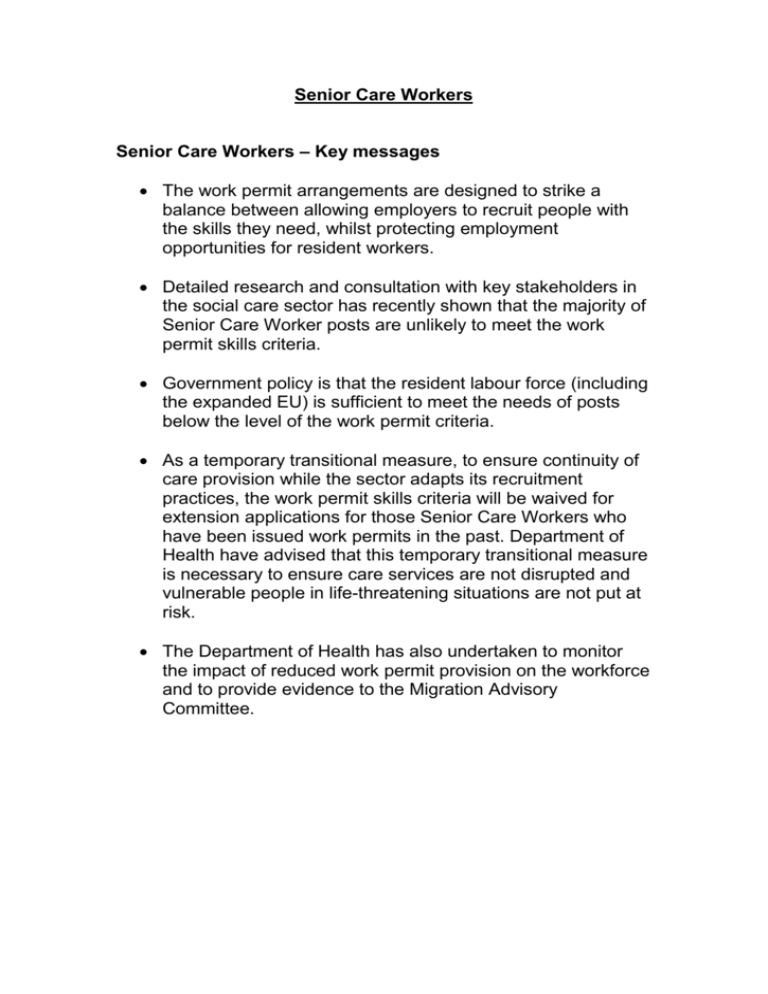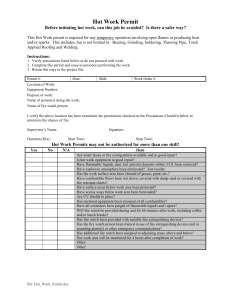Senior Care Workers
advertisement

Senior Care Workers Senior Care Workers – Key messages The work permit arrangements are designed to strike a balance between allowing employers to recruit people with the skills they need, whilst protecting employment opportunities for resident workers. Detailed research and consultation with key stakeholders in the social care sector has recently shown that the majority of Senior Care Worker posts are unlikely to meet the work permit skills criteria. Government policy is that the resident labour force (including the expanded EU) is sufficient to meet the needs of posts below the level of the work permit criteria. As a temporary transitional measure, to ensure continuity of care provision while the sector adapts its recruitment practices, the work permit skills criteria will be waived for extension applications for those Senior Care Workers who have been issued work permits in the past. Department of Health have advised that this temporary transitional measure is necessary to ensure care services are not disrupted and vulnerable people in life-threatening situations are not put at risk. The Department of Health has also undertaken to monitor the impact of reduced work permit provision on the workforce and to provide evidence to the Migration Advisory Committee. Q & A for Press Office, Business Teams and general enquiries How many people are working in the UK as Senior Care Workers? They are currently approximately 19,000 people working in the UK who have applied under this route. The social care workforce is three quarters of a million strong in total across the UK and work permit holders make up just two and-a-half per cent of that group. How long would an individual’s work permit last? This depends on the period requested by the employer making the initial application and could be anything up to five years. When applying what do individuals have to show to prove they have NVQ level 3? The requirements of the post on offer must meet the work permit criteria. Employers making applications must provide copies of the individual's past employment references and qualifications that demonstrate they meet the requirements of the post on offer. Have these individuals been abusing this route? Recent research has shown that the occupational requirements stated on application forms submitted by employers and recruitment agencies for work permits cannot be justified. This does not imply that the individuals are themselves lacking in skills, only that the posts that they are filling are unlikely to meet the work permit skills criteria as many of them contain a large proportion of duties at NVQ level 2 or below. What would you do if you found someone had lied on their application? If we find evidence that an individual has provided false documentation in their application for leave to enter the UK we can revoke that leave and remove the individual from the UK. What is actually changing from today, how does the guidance differ apart from the transition arrangements? The occupational guidance has been completely revised in light of the recent research and consultation with stakeholders. This guidance advises work permit caseworkers on current and planned industry requirements for the post of senior care worker, and provides updated labour market information to enable them to apply the existing work permit criteria correctly. There are no changes to the work permit criteria themselves. In line with the latest salary data from the industry, the new guidance includes a minimum salary rate of £7.02 per hour. It is, and has always been, a requirement of the work permit arrangements that work permit holders must be paid at least equal to resident workers doing similar work. We expect employers to pay a salary appropriate to skilled workers if they wish to retain skilled work permit holders. Q – Why are we refusing work permits for Senior Care Workers? A – Decisions on work permit applications are made on a case-by-case basis, using all the knowledge we have available to us at the time of assessing the application. The Border and Immigration Agency has a legal obligation to ensure that the work permit criteria are applied correctly. We will not refuse work permits for Senior Care Workers where their posts meet the work permit skills criteria. However, detailed research and consultation with key stakeholders indicates that the majority of Senior Care Worker posts are unlikely to meet the work permit skills criteria. Q – Why are you singling out Senior Care Workers? / Why are you changing your policy? A – We aren’t. Work permits are issued for jobs which meet specified skills criteria. We only issue work permits for jobs where the entry requirements are: a UK degree level or equivalent professional qualification; or a relevant HND level qualification; or an HND level qualification that is not relevant, plus one years' relevant work experience; or at least 3 years relevant experience at NVQ level 3 or above. These criteria were agreed through public consultation as the best means of striking a balance between allowing employers to recruit people with the skills they need, whilst protecting employment opportunities for resident workers. There have been no changes in this policy since 2000. Work permits continue to be issued for posts where the criteria are met. What does change (and grow) over time is our knowledge of various employment sectors. The latest occupation sheets used by caseworkers are available on the Border and Immigration Agency website. This guidance advises caseworkers how the work permit criteria relate to various occupations. Q – Why are we refusing where we have issued work permits for Senior Care Workers in the past? A – Although work permits have been issued for Senior Care Workers in the past, recent research has shown that the occupational requirements often stated on work permit application forms cannot be justified. Applications where there is doubt will be challenged, and where they do not meet the criteria, refused. Q – What about existing work permit holders? A – As a transitional measure, to ensure continuity of care provision whilst the sector adapts its recruitment practices, the work permit skills criteria will be waived for extension applications for Senior Care Workers considered after 13 August 2007. All other criteria (e.g. salary) will continue to apply. These transitional measures will be in place for in-country extension applications considered before the third quarter of 2008, when Tier 2 of the Points Based System will come into operation (Tier 2 will provide a migration route for skilled workers with a skilled job offer to fill gaps in the labour market.). Q – Why are you giving preferential treatment to Senior Care Workers, whilst refusing extensions in other sectors? A – We would not normally waive essential criteria. Previous work permit approval should not be taken as a guarantee that similar applications will be approved in future, if new information shows that the post does not meet the criteria. The Border and Immigration Agency is prepared to make an exception, and waive one of the key elements of the Government’s overall immigration strategy, owing to the vulnerability of the client groups this sector provides care for. Department of Health have advised that these transitional measures are necessary to ensure care services are not disrupted and vulnerable people in life-threatening situations are not put at risk. Q – What if an existing work permit holder wishes to change employment? A – Any change of employment application must satisfy the full skills criteria. As with first applications, employers must provide a robust business case to justify the qualifications and/or experience requested. The transitional arrangements are intended to ensure continuity of existing care staffing, not to allow employers to recruit non-EEA nationals to fill new vacancies for posts below the level of the work permit skills criteria. Q – What about extensions that have been refused previously? A – Decisions on applications are made according to the rules and policies that are in place at the time. The waiving of the skills criteria for Senior Care Worker extension applications only applies to applications considered after 13 August 2007. Customers should note that for in-country extension applications to be approved all elements of the post must be unchanged, with the exception of the salary being offered. The salary must now meet the new minimum rate of £7.02 per hour. Customers who have had previous in-country extension applications refused will not have their cases reopened but should apply again enclosing the correct fee. If the extension application was refused within the past 28 days, customers may apply for a review of the decision, which will be considered in line with the new transitional measures. In line with paragraph 113 of the Business and Commercial Guidance for Employers, extension applications should be made no more than three months before the person’s permission to stay in the country runs out. If approved, the work permit holder should apply for Further Leave to Remain as soon as possible. Q – What about Technical Changes of Employment? A – There is no consideration of the post involved in a Technical Change of Employment. This is purely a notification of change of details. Technical Changes will be processed without reference to new occupational guidance. Q – Can work permit holders move homes? A – Under the Technical Change of Employment criteria, the work permit holder must be filling the same vacancy for which the work permit was issued. If the vacancy moves to a different address, a Technical Change of Employment may be approved. However, if an employer wishes the work permit holder to fill a different vacancy, a Change of Employment application is required (see above). Q – Who have we consulted? A – We have consulted the Department of Health, relevant Departments in devolved Government administrations in Scotland/Wales/Northern Ireland, Skills for Care and Development (the Sector Skills Council), Commission for Social Care Inspection (CSCI, the regulatory body) and various employers, both public and private sector. The General Social Care Council (GSCC) have been made aware that this research has taken place, and have contributed to the development of the guidance. Q – Why do we not think these are skilled posts? A – We do not doubt that Senior Care Workers fulfil an important function within the care industry. We have carried out in-depth research in consultation with the sector. This research has shown that the majority of Senior Care Worker posts require an NVQ level 3 qualification and/or previous experience at NVQ level 2. In addition, the latest evidence indicates that employers are unable to justify at least 3 years relevant experience at NVQ level 3 or above as a genuine occupational requirement for the role of Senior Care Worker. It is now apparent that many posts for which work permit applications have been submitted contain a large proportion of duties at NVQ level 2 or below. For a post to be considered as meeting the work permit skills criteria, all the duties must be at NVQ level 3 or above, and the post must clearly justify the need for an individual with the qualifications and/or experience described in the skills criteria. This means that, whilst a level of skill is required for the role of Senior Care Worker, it is usually not a level which satisfies the work permit criteria. We expect and encourage employers to open up career opportunities for resident workers for jobs of these kinds. Work permits will continue to be issued where employers are able to justify that the work permit criteria are met. Q – Will any new work permits be granted for Senior Care Workers in future? A – The Scottish Executive have confirmed that, in Scotland, there is a regulatory requirement for Senior Care Workers in residential child care to hold a relevant S/NVQ level 4 qualification (equivalent to HND-level). These posts clearly meet the work permit criteria and will continue to be approved. Sector organisations have confirmed that other Senior Care Worker roles can be carried out by an individual who has achieved a relevant NVQ level 3 qualification. Employers who set their entry requirements higher than this should provide a robust business case as part of any work permit application, explaining what it is about the post on offer that requires a higher level of qualifications and/or experience than the industry norm. This should include supporting evidence from independent, third party organisations where possible. Such applications will continue to be considered on a case-by-case basis. Q – How can we recruit when there aren’t enough resident workers? A – The Government expects employers to recruit and open up career opportunities for Care Workers within the resident UK or wider EEA labour market to fill vacancies below the level of the work permit skills criteria. Large numbers of workers from the expanded European Union have already been recruited to fill social care vacancies. The Healthcare Sector Advisory Panel (whose membership includes the Department of Health, Sector Skills Councils, and other key sector experts) have confirmed that there are no national skill shortage issues with regard to social care. Evidence shows that employers who offer appropriate salaries for skilled positions are able to recruit and retain resident workers with the necessary skills and provide vulnerable people in our society with the level of care they need. Q – Why should we recruit from the EEA when non-EEA workers have better English language skills? A – Government policy is that the resident labour force (including the expanded EU) is sufficient to meet the needs of lower skilled work below the level of the work permit criteria. Where there are training gaps, employers are expected to provide and invest in appropriate development. Q – We will need to increase salaries. How can we afford this? A – It is a requirement of the work permit arrangements that work permit holders must be paid at least equal to resident workers doing similar work. Therefore, where employers are fully compliant with the work permit requirements, they should already be offering salaries that will attract suitable resident workers. Q – What if employers are not prepared to offer the updated salary level on extension applications? A – The transitional arrangements for extension applications exist to provide continuity of care provision. We expect employers to pay a salary appropriate to skilled workers if they wish to retain skilled work permit holders. Q – What if care homes are forced to close? A – We do not subsidise private industry in any sector. We are continuing to work closely with Department of Health to monitor any impact of reduced work permits on care services provision. If, in time, robust labour market evidence supports an ongoing need for migrant workers, the Migration Advisory Committee may consider recommending the introduction of lower skilled immigration arrangements for the social care sector under the Points-Based System. Q – We think there is a skill shortage now. What are you going to do about it? A – The National Shortage Occupation List contains the skill shortages recognised by the Border and Immigration Agency. Occupations must meet the work permit skills criteria if they are to be included on the list. Robust labour market evidence is required to support the inclusion of an occupation on the list. This must include labour supply and demand forecasts over at least the next five years, at a national level. Home Office Ministers also require that sectors provide evidence of measures being taken to address any shortages, in order that migrant labour is not seen as a fix-all solution. Employers who believe there is a national skill shortage are advised to contact the relevant Sector Skills Council for assistance in gathering evidence and presenting a robust business case to the Border and Immigration Agency. The Department of Health has undertaken to monitor the impact of reduced work permit provision on the workforce and to provide evidence to the Migration Advisory Committee. Q – What is being done to ensure the social care sector can find the skills it needs from within the UK? A – The proposal to establish a Skills Academy was announced by Ivan Lewis (Minister for Care Services) at the Association of Directors of Adult Social Services (ADASS) Spring Seminar at the end of April 2007. It builds on the recommendations of the Platt Report on raising the status of social care. The Skills Academy will be developed through an inclusive approach with all parts of the social care sector, including the independent and third sectors; and drawing upon the experience of skills sector in its broadest sense. It is envisaged that the Skills Academy will focus on developing leadership and commissioning skills for social care. Q – You have been refusing Senior Care Worker applications for months. Why has it taken so long to issue new guidance? A – There have been no rules changes or occupational guidance issued to caseworkers until now. It is critical that new guidance is not issued until all key stakeholders have been consulted and their advice sought. Whilst this consultation has been ongoing, caseworkers have sought clarification from employers making applications regarding the requirements for resident workers appointed to their senior care worker role, and how resident workers would be expected to gain the required qualifications and experience. Caseworkers have sought this clarification to ensure that applications are only approved where the existing work permit criteria are met. The Border and Immigration Agency has a legal obligation to ensure that the work permit criteria are applied correctly. This clarification has shown that the shown that the majority of Senior Care Worker posts for which work permits are sought do not meet the work permit skills criteria, and that the requirements for overseas nationals had been tailored to the criteria. It is only now that we have concluded our consultation that the need for transitional measures has become clear, and these measures have been agreed with sector stakeholders.





